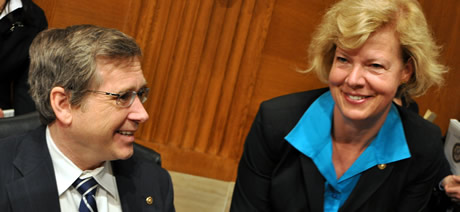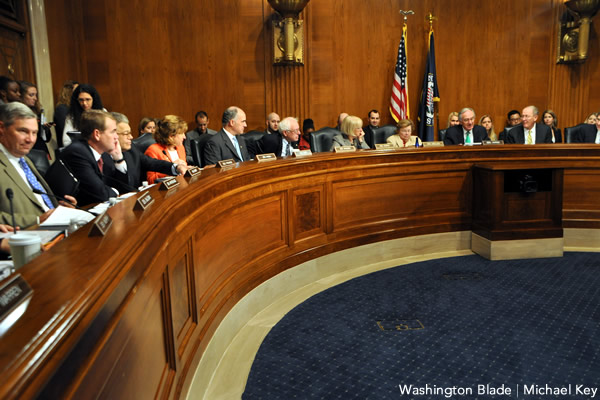Politics
HISTORIC: Senate panel advances trans-inclusive ENDA
In first, committee reports out trans-inclusive LGBT anti-bias bill


Senate Health, Education, Labor & Pensions Committee approved a trans-inclusive ENDA on Wednesday (Washington Blade photo by Michael Key)
A Senate committee made history on Wednesday by approving for the first time a trans-inclusive version of the Employment Non-Discrimination Act and picking up key Republican support from Sens. Orrin Hatch (R-Utah) and Lisa Murkowski (R-Alaska).
Lawmakers on the Senate Health, Education, Labor & Pensions Committee reported out ENDA by a 15-7 vote after a short period of discussion. No amendments were offered except for a manager’s amendment, although Sen. Lamar Alexander (R-Tenn.) said he’ll reserve three that he planned for consideration on the Senate floor.
Senate HELP Committee Chair Tom Harkin (D-Iowa) noted the historic nature of the committee’s action prior to the vote and said it’s “time, long past time” for Congress to take action against LGBT workplace discrimination.
“Qualified workers should not be turned away or have to fear losing their livelihood for reasons that have nothing to do with their qualifications, skills or performance,” Harkin said. “Let’s not mince words: such practices are un-American. They should have no place in any American workplace.”
All 12 Democrats on the committee, including lesbian Sen. Tammy Baldwin (D-Wis.), are co-sponsors of the bill as well as one Republican, Sen. Mark Kirk (R-Ill.). They each voted in favor of ENDA during the final vote.
At the start of the markup, Kirk explained he has supported ENDA — both in his capacity as a U.S. House member and a U.S. senator — because gay people should “not have that cloud of potential discrimination” in the workplace.
Speaking with reporters afterwards, Kirk explained his support for ENDA derives in part from his work as an officer in the Navy Reserve.
“For me, as you guys know, I’m a military guy,” Kirk said. “We think about how blindingly idiotic it was for Adolf Hitler to discriminate against the Jews. When you think about all the Senate pieces of the Manhattan Project, we actually developed a war-winning weapon because we were protecting creativity and science, and we became a much stronger society that allowed us to prevail. The society that is more open will be stronger, in my view, probably economically and militarily.”

Sen. Mark Kirk (R-Ill.) and Sen. Tammy Baldwin (D-Wis.) (Washington Blade photo by Michael Key)
New support for ENDA also came from Republicans on the panel: Hatch and Murkowksi. Hatch voted “yes” by proxy and Murkowski voted “yes” in person. The Alaska senator is the third sitting Republican U.S. senator to come out in favor of marriage equality.
In a statement after the markup, Murkowski said she voted “yes” because “discrimination should never be tolerated in the workplace.”
“I am a strong believer that individuals should be judged on whether they can do the job, not their sexual orientation – and I appreciate the hundreds of Alaskans who shared their thoughts with me and my staff as we considered this bill,” Murkowski said.
While she said improvements to the bill “might be in order in the form of floor amendments,” Murkowski added she’s pleased ENDA addresses “employers’ needs to run efficiently and reduce compliance costs” by prohibiting discrimination claims based on disparate impact.
In a statement provided to the Washington Blade, Hatch explained he was able to support ENDA because of the strong religious exemption in the bill.
“I appreciate that the authors of the bill were willing to include a robust religious exemption in this bill,” Hatch said. “I voted for it because it prohibits discrimination that should not occur in the workplace, it protects the rights of religious entities, and minimizes legal burdens on employers.”
The bill now heads to full Senate for passage on the floor, where 60 votes will likely be necessary to overcome a Senate filibuster. During the markup, Harkin said he expects ENDA to come to the floor “sometime in the fall,” but not before lawmakers leave for August break.
Asked by the Washington Blade after the committee vote whether he’s confident that ENDA will find 60 votes on the Senate floor, Harkin replied, “Yeah, I think we’ll have 60 votes.”
“As you saw, we had some very key Republicans on the committee, and that will be very helpful,” Harkin said. “As I said, I think society is there, and the things that have recently happened with the Supreme Court decision and others, I think we’re ready to move on in a way that we haven’t been ready move on in the past. Keep your fingers crossed.”
But Senate Majority Leader Harry Reid (D-Nev.) is responsible for scheduling what comes to the floor in the Senate. His office didn’t immediately respond to a request for comment on when an ENDA floor vote would take place. In his Pride statement issued last month, Reid said he looks forward to bringing up ENDA “soon.”
White House Press Secretary Jay Carney issued a statement saying President Obama “welcomes” the bipartisan support ENDA received in committee and looks forward to further action.
“The President has long supported an inclusive ENDA, which would enshrine into law strong, lasting and comprehensive protections against employment discrimination on the basis of sexual orientation or gender identity,” Carney said. “We look forward to the full Senate’s consideration of ENDA, and continue to urge the House to move forward on this bill that upholds America’s core values of fairness and equality.”
It was the first markup of ENDA in the Senate since 2002 and the first time ever a committee in either chamber of Congress approved a version of ENDA that protects not only gay, lesbian and bisexual people from workplace discrimination, but also transgender people.
Mara Keisling, executive director of the National Center for Transgender Equality, said a trans-inclusive ENDA has been advancing all along, but committee approval of the bill with gender identity protections is “really amazing.”
“This is a life-or-death issue for trans people, and I think this shows that we’re moving, we’re going to get it done,” Keisling said. “Next, we’re going to get it passed in the Senate, and we’re going to try to figure out how to get it through the dysfunctional House of Representatives. But it’s really important and shows trans people everywhere that this is going to happen — whether it’s this year or another year — it’s going to happen. We are going to get relief from job discrimination.”
Transgender inclusion in ENDA has been a sensitive issue in the LGBT community. In 2007, gay former Rep. Barney Frank (D-Mass.) removed ENDA’s gender identity provisions before holding a House vote on the bill because he said the votes were lacking to pass the legislation with those protections on the House floor. The decision led to an outcry and ENDA advanced no further even though Democrats controlled both chambers of Congress.
Tico Almeida, president of Freedom to Work, praised the Senate committee approval of ENDA, calling the vote “fantastic.”
“It was a big, bipartisan win, and we’re going this ride momentum to 60 votes by September,” Almeida said. “We think we can get to 60 votes in the Senate in September — possibly October if it takes that long. We could actually get between 60 and 65 votes in the end in the Senate, and that huge momentum will allow us to do some real campaigning with members of the House.”
Despite the support ENDA’s religious exemption has received from Republicans like Hatch, there are differing opinions on the language within the LGBT community.
Unlike existing employment discrimination law under Title VII of the Civil Rights Act, ENDA’s religious exemption provides leeway for religious organizations, like churches or religious schools, to discriminate against LGBT employees.
Some ENDA supporters, like the Center for American Progress, say ENDA’s religious exemption is politically necessary for the bill to pass Congress, while others, like the American Civil Liberties Union, say it allows for continued LGBT workplace discrimination. No action was taken on the religious exemption during the markup.
Ian Thompson, legislative representative for the ACLU, said after the markup he’s pleased with the progress on ENDA, but added the growing support for LGBT rights demonstrates the bill’s religious exemption may no longer be necessary.
“Today’s vote clearly demonstrates that the tide has turned on LGBT rights,” Thompson said. “What was true five, 10, and 20 years ago is no longer the case. To that end, I think it is becoming increasingly clear that there is no reason to adopt an exemption that would needlessly dilute ENDA’s critical protections.”
Before final passage, the committee approved by unanimous consent a manager’s amendment that made technical changes to ENDA.
Some changes were made at the behest of GOP supporters who wanted clarification on certain issues. Among them is ensuring under ENDA disparate impact claims are not allowed; a plaintiff cannot recover for the same offense under both Title VII of the Civil Rights Act and ENDA; and an employer can amend an existing poster notifying employees of the non-discrimination policy, rather than creating a separate poster.
The manager’s amendment also updates ENDA in the wake of Supreme Court rulings on employment non-discrimination law. Following the Supreme Court’s decision in the 2009 case of Gross v. FBL Financial, the bill now includes language to ensure that the burden of proof in mixed motive cases is the same under ENDA as it is under Title VII.
Almeida, who had called for an update to ENDA in the wake of the Gross ruling, commended Harkin and his counsel for “fixing the loopholes and technical mistakes” that existed in the original version of ENDA.
“Some were on the left, and some were on the right,” Almeida said. “By making these corrections, Chairman has shown respect for Republicans on the committee and created a smarter, better Employment Non-Discrimination Act.”
Congress
House Republicans advance two anti-trans education bills
Congresswoman Jahana Hayes, LGBTQ groups slammed the effort

Republicans members of the House Education and Workforce Committee advanced two anti-transgender bills on Wednesday, one that would forcibly out students in public elementary and middle schools to their parents and a second covering grades K-12 that critics have dubbed a “don’t say trans” bill.
More specifically, under the PROTECT Kids Act, changes to “a minor’s gender markers, pronouns, or preferred name on any school form or sex-based accommodations, including locker rooms or bathrooms” could not be made without parental consent, while the Say No to Indoctrination Act would prohibit schools from teaching or advancing “gender ideology” as defined by President Donald Trump’s anti-trans Jan. 20 executive order, Defending Women from Gender Ideology Extremism and Restoring Biological Truth to the Federal Government.
U.S. Rep. Jahana Hayes (D-Conn.), who was named national teacher of the year before her election to Congress, rose to speak out against the bills during the committee’s convening on Wednesday.
“Curriculum does not include teaching students to be something else. Curriculum does not include indoctrinating students to identify as gay or LGBTQ or other or anything. But federal law mandates that all students have civil rights protections,” she said.
The congresswoman continued, “I don’t really understand what the members of this committee think happens in schools, but my question is, what do we do with these children? The children who you are saying, on this committee, don’t exist, the children who are struggling with their identity and often times confide in their teachers and ask for support and help.”
“What we’re doing in this committee is focusing on a small population of students who are at a point in their life where they are struggling and school may, for many of them, feel like the only safe place or the only place where they can get support, or the only place where they can speak to a counselor,” Hayes said.
“And as a teacher, I don’t care if it was just one student that I had to reassure that they were important and they were valued and they belonged here,” she said. “I’m going to do it, and anyone who has dedicated their life to this profession will do the same. So the idea that you all feel okay with arbitrarily erasing, disappearing people, making them think that they they don’t exist, or they don’t have a place in schools, or the curriculum should not include them, or whatever they’re feeling should not be valued, considered, Incorporated, is just wrong.”
“So I will not be supporting this piece of legislation, as if that was not already evident, and I will be using all of my time, my agency, my energy, my advocacy, to ensure that every student,” Hayes said, “feels valued, respected, important and included in the work that I engage in on this committee.”
The congresswoman concluded, “when you are in a classroom and you are a teacher, and that door closes and a student falls in your arms and says to you, I am struggling, and I can’t go home with this information, and I need Help, you have a moral responsibility to help that child or you are in the wrong profession. I yield back.”
The Congressional Equality Caucus slammed the bills in an emailed statement from the chair, U.S. Rep. Mark Takano (D-Calif.), who noted that the legislation comes as “Donald Trump is illegally trying to dismantle the Department of Education and pass tax cuts for billionaires.”
“Extreme Republicans in Congress are trying to distract Americans by advancing cruel, anti-trans legislation,” said the congressman, who is gay. “School districts, teachers, and staff best understand how to draft age-appropriate, inclusive curriculums and craft policies that both respect the important role parents play in children’s education and the importance of students’ safety.”
“Yet, Republicans’ Don’t Say Trans Act would cut critical funding for schools if their teachers teach lessons or include materials that simply acknowledge the reality of trans peoples’ existence,” Takano added. “Republicans’ forced outing bill would put kids in danger by requiring schools that want to take certain steps to affirm a transgender student’s identity to forcibly out them to their parents — even if the school knows this will put the student’s safety at risk.”
The caucus also slammed the bills in a series of posts on X.
🚨BAD BILLS ALERT🚨
— Congressional Equality Caucus (@EqualityCaucus) April 9, 2025
Today, the GOP-controlled Education Committee is voting on two anti-trans bills: One to force teachers to out trans students if they want to take certain steps to affirm the students’ identities, and a “Don’t Say Trans” bill.
Here's why we’re opposed: 🧵
The Human Rights Campaign also issued a statement on Wednesday by the organization’s communications director, Laurel Powell:
“Instead of putting our dangerous President in check and tackling the American economy’s free fall, House Republicans showed where their priorities lie — giving airtime to junk science and trying to pass more anti-LGBTQ+ legislation.
“Forcing teachers to ‘out’ trans youth rather than supporting them in coming out to their families and demanding that schools ignore the trans students who sit in their classrooms is a craven attempt to distract people from economic disaster by vilifying children.
“Even as they fire people whose jobs were to make sure schools have the resources they need, the Trump administration and their allies in Congress continue to attack vulnerable young people to score points with the far right.”
Politics
Trump’s battle with Maine over trans policies escalates
State has filed a lawsuit, federal government has cut funding and launched investigations

A months-long standoff between between President Donald Trump and Maine Gov. Janet Mills (D) continued to escalate this week with a lawsuit targeting the administration on Monday and cuts to federal grants to the state on Tuesday.
The conflict kicked off on Feb. 21 at the White House, where the president threatened Mills with retaliation after she declined to say that her state would not comply with his executive order barring transgender athletes from competing in school sports. The governor and other officials have said the policy is in conflict with provisions of the Maine Human Rights Act, while the president argued his executive action supersedes state law.
While the heated exchange between the two concluded with each party vowing to see the other in court, developments in the time since suggest that Trump and Mills are likely to square off over legal questions far broader than whether the White House can prohibit trans girls in a blue state from joining the field hockey team.
In a complaint filed on Monday, Maine Attorney General Aaron Frey argued U.S. Department of Agriculture Secretary Brooke Rollins had unlawfully frozen funding for “certain administrative and technological functions” in schools in his state after concluding, in the absence of a formal investigation, that some of their programs violated Title IX rules. A letter last week from Rollins notifying Mills of the USDA’s decision warned that it was “only the beginning.”
Then on Tuesday, the Maine Department of Corrections said the Justice Department had cancelled several grants, which according to the Maine Morning Star would have supported “drug treatment for adults in reentry, programs that foster engagement between incarcerated parents and their children, and resources for corrections agencies to improve post-release supervision in order to prevent recidivism and reduce crime.” U.S. Attorney General Pam Bondi said during an interview that the move came in response to the state’s incarceration of a transwoman in a women’s prison.
One of Trump’s day-one executive actions targeting trans rights included a provision directing the AG and the Homeland Security secretary to ensure that women’s prisons and detention centers do not detain or house “males” or trans women, though here and elsewhere the administration deliberately does not make the distinction — and in Section 2 of the order, establishes that the policy of the federal government will be to treat gender as a binary that is fixed at birth, a narrow definition that denies the biological reality that people can be intersex (meaning their sex characteristics cannot be clearly distinguished as male or female) while others, like trans individuals, may experience incongruity between their gender and birth sex.
Leading up to this week, other major developments following the Feb. 21 White House confrontation between Trump and Maine’s Democratic governor include:
- A probe in late March by the U.S. Department of Education into whether policies in Maine schools that protect the privacy of students by prohibiting disclosures to parents about the sexual orientation or gender identity of their kids may violate federal law,
- Trump’s demand for an apology from Mills on her refusal to do so, both in late March,
- DOE’s determination in late March that schools in the state were violating Title IX by allowing trans women and girls to compete in sports, which came after the Trump administration reversed that portion of the Title IX guidance issued under former President Joe Biden,
- An announcement in mid-March by the the U.S. Department of Health and Human Services Office for Civil Rights that the Maine Principals’ Association and Greely High School violated Title IX by allowing trans athletes to compete in sports,
- The USDA’s decision in early March to hold up funding for universities in the University of Maine system pending the conclusion of the agency’s probe into possible violations of Title IX and Title VI, which was subsequently reinstated after a couple of weeks,
- The National Oceanic and Atmospheric Administration’s withdrawal of funding in early March for the University of Maine’s Maine Sea Grant program, which was followed less than a week later with the U.S. Department of Commerce ‘s announcement that it would be renegotiated, and
- HHS’s determination in late February that the Maine Department of Education violated Title IX, a conclusion reached just four days after an investigation was opened and without any interviews, data requests or negotiations.
Congress
Chris Pappas launches Senate bid in N.H.
Video references ‘political extremists who want to take rights away’

Gay U.S. Rep. Chris Pappas (D-N.H.) launched his bid for the seat held by retiring U.S. Sen. Jeanne Shaheen (D-N.H.) with a video posted to X Thursday morning and kickoff event planned for the evening in his hometown of Manchester, N.H.
“I’m running for Senate because our economy, our democracy, and our way of life are on the line, and New Hampshire deserves a senator who is grounded in the people, places, and values of this state,” he said in a press release. “Granite Staters know my record of taking on the big fights and looking out for them — pushing tax cuts for working families and small businesses, taking on predatory companies and corporate polluters, and standing up to Big Pharma to lower drug costs.”
Pappas’s statement continued, “Like Sen. Shaheen, I’ll always put New Hampshire first. You can count on me to lead the charge to confront this administration, self-dealing billionaires, and extreme politicians who threaten our future and our ability to get things done for New Hampshire.”
In his video, the fourth-term congressman pledged to rein in the power of big corporations, and he addressed “veterans, parents, small business owners,” and the “people who have done everything right” but are “asking ‘why does it feel like the system is rigged?'”
Referencing concerns with the Republican administration and GOP majorities in Congress, he said, “You think about the social security office that’s gonna be closed in Littleton, drastic cuts to Medicaid, all in the name of giving big tax breaks to billionaires like Elon Musk.”
Pappas also seemed to allude to anti-LGBTQ moves by the White House and congressional Republicans, promising to stand up to “political extremists who want to take rights away.” The ad wrapped with a shot of the congressman with his husband Vann Bentley. “We will get our country back on track. Stronger, fairer, freer, working for everyone.”
I’m in.
— Chris Pappas (@ChrisPappasNH) April 3, 2025
Today I’m announcing my campaign for U.S. Senate because New Hampshire needs a fighter who gets things done.
Let’s do this. pic.twitter.com/bAyE5u4LSk
Freshman U.S. Rep. Maggie Goodlander (D-N.H.) is also considering a run for Shaheen’s seat while former U.S. Sen. Scott Brown (R-Mass.) and former New Hampshire Gov. Chris Sununu are mulling campaigns.
Pappas was endorsed by the LGBTQ Victory Fund, whose newly seated CEO Evan Low released a statement:
“Rep. Chris Pappas has a long and storied history of serving New Hampshire, and LGBTQ+ Victory Fund has been right by his side since he ran for state office 23 years ago. He has a track record of taking on big fights for his constituents and has proven that he can win tough races, outperform expectations, and flip key Granite State seats. Whether its strengthening the economy, protecting bodily autonomy or taking on price gougers, Chris will continue to be an important voice that looks out for the people of New Hampshire.
“We need Chris’s pro-equality voice in the Senate, where right now we only have one LGBTQ+ member. He will be a strong fighter against anti-equality forces in the current administration and extreme politicians looking to erase our rights and existence.
“His presence in the Senate will be critical to retake the majority and ensure that Granite State voters won’t get a raw deal. Chris deeply understands New Hampshire, and his record shows that he is laser-focused on getting things done. We are thrilled to endorse Chris Pappas for a history-making place as the first out LGBTQ+ man to serve in the Senate.”
-

 District of Columbia5 days ago
District of Columbia5 days agoWorldPride organizers may warn trans people from abroad not to attend event
-

 Opinions4 days ago
Opinions4 days agoIt’s time for new leadership on the Maryland LGBTQIA+ Commission
-

 The White House3 days ago
The White House3 days agoWhite House does not ‘respond’ to reporters’ requests with pronouns included
-

 Noticias en Español4 days ago
Noticias en Español4 days agoINDIGNACIÓN: ¡El transfeminicidio de Sara Millerey en Colombia nos cuestiona como sociedad!












